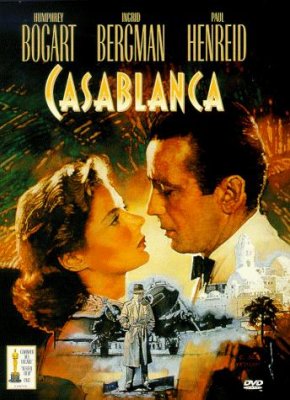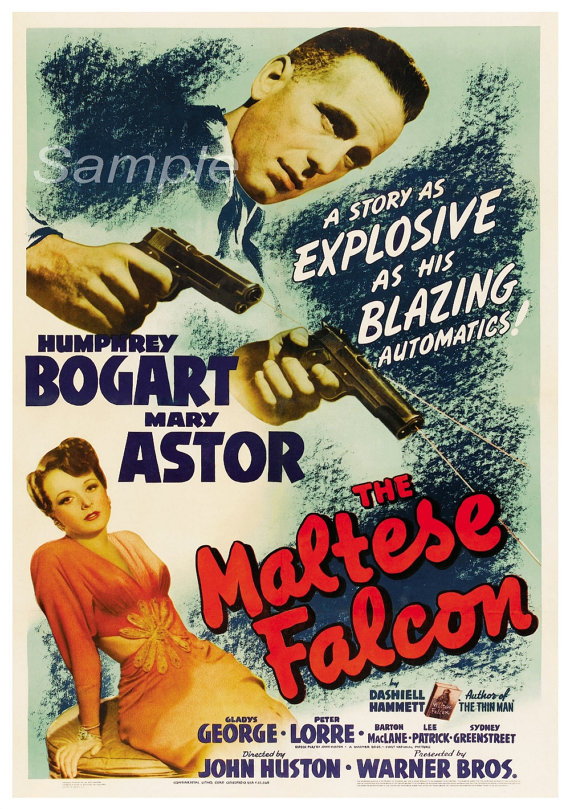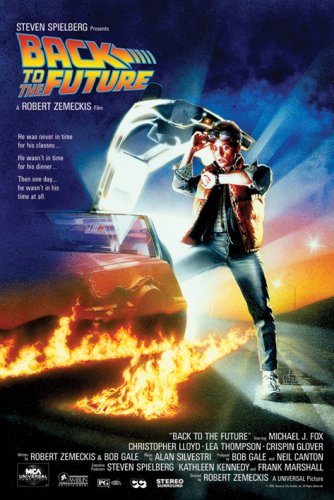
Whoever Kaplan is, he’s
got nothing on Cary Grant
“The Godfather” was released in 1972. At the time, Cary Grant was 68 years old — ideal, perhaps, for Vito. Is it possible to imagine Grant in the role of Don Corleone? No, not really. That wasn’t the Cary Grant brand, he likely was never seriously considered for it, and so the role went to Marlon Brando, only 48 around that time, giving Brando the upper hand in the argument as to who was the greatest film actor ever.
The standard-bearer of the Cary Grant brand is “North by Northwest,” a Hitchcock pairing that swerves wonderfully from adventure to comedy to suspense. But as the legend goes, Grant might not’ve been the first choice; Jimmy Stewart supposedly had the role until “Vertigo” proved to be a box-office clunker. According to anecdotes, even Grant was surprised at the popularity of “North by Northwest.” Taken literally, the plot is absurd. Somehow, Grant and Hitchcock make it buyable, producing some of Hollywood’s most famous scenes.
There is a curious little parallel with the 21st century version of the “Ocean’s 11” series helmed by George Clooney. The films want to remind us periodically that this isn’t so much Roger Thornhill or Danny Ocean, but Cary Grant and George Clooney. We’re watching the real thing more or less playing himself, under the very thin guise of a character. The “Ocean’s” movies might have been tired remakes, but something about “North by Northwest” is a triumphant tribute to the persona known as Cary Grant.
Grant pretty much always played the hero, but in “North by Northwest” is introduced as not the most likable sort. He’s a fast-talking advertising executive who will scam someone out of a taxi. “In the world of advertising there’s no such thing as a lie — there’s only the expedient exaggeration,” he declares.
Like many other Hitchcockian males, he has issues with his mother, and their relationship seems more like a business arrangement. When she agrees to obtain a room key in scurrilous fashion for $50, it should be alarmingly tacky, but instead is hilarious. Whatever his values, there is something likable about Roger Thornhill’s determination, defiance and cool. This is a guy who suddenly walks into one life-threatening situation after another yet is merely interested in making it home in time for a play.
We see how Roger Thornhill could be legitimately mistaken for Kaplan during a busy lunch. From that point on, we gladly suspend disbelief. The idea that bad guys could go to such lengths to commandeer a home of a VIP, then quickly undo it all, puts this film high up on the lengthy list of Overthinking Criminals. You would think, being such an efficient organization, they would want to verify the identity of “Kaplan” before wasting any of their time on him. And why would they take the time to stage a car accident rather than just push him over the cliff? It is almost criminality for the sake of being clever. But again, we don’t care, and the extremism is actually compelling. Someone has gone to such bizarre lengths to frame Roger Thornhill, we can’t help but wonder why.
Grant’s roots were at least partly in comedy, and one wonders how funny he could’ve been if he ever let himself go. As Thornhill, he never flinches once, but gradually extends the character to the point we can believe what he does at the end. He is never afraid of the bad guys, just annoyed by them. He has to bungle his way out of his early troubles, but gets better and better at the art of spying and deception, dropping a funnier and funnier deadpan line each time. His best comes when he has made a mockery of an art auction, then while being dragged away declares, “I haven’t finished bidding yet!” And he does most of it in the same suit; an unflappable Madison Avenue guy.
Geography is a big part of the film’s appeal. New York is an exciting place, and Hitchcock expertly taps into the hustle and bustle to get the film off the ground, much like Oliver Stone does in a much different movie, “Wall Street.” You see all kinds of people in suits, conducting business lunches in fine hotels, angling for cabs, briskly walking to their next appointment. And we’ll soon be taken to the U.N., site of many movie assassination plots, but none quite as striking as this one.
Fans of Grant and/or fans of Hitchcock have likely also seen “Notorious” and will easily note the similarities. The government is conducting espionage against the enemy du jour and is heartlessly using a non-professional young woman as its informant. In each film Grant plays the designated protector of the woman, but in “Northwest” he is merely an amateur himself. This is an appealing theme used in many other movies (let’s say, for this example, Karen Black in “Airport ’75” or Harrison Ford in “The Fugitive”), where an amateur is suddenly forced to become a real professional at something and quickly figures it out.
As in “Notorious,” Grant will question or doubt the government’s intentions and at some point accuse the woman of too readily agreeing to take part in the scheme. But “Notorious” is a celebration of great drama that happens to include great stars; “North by Northwest” is a celebration of Cary Grant that happens to be wrapped in appealing entertainment.
Hitchcock takes virtually every scene to its extremes, in particular the famous crop-dusting attack. Every year during the Oscars, the montage of great moments in motion pictures tends to include this snippet. Like the rest of the film, it is so bizarre, a ridiculously overplanned attack that allows for stunning visuals. But is it truly a perfect series of scenes? The bullets seem to fly well after the biplane has passed. This would be explained if the shooter was firing from the rear, although it would figure to be harder to see that way.
The opening credits reveal the movie was filmed in VistaVision. It produces a glossy, vibrant picture perfectly suited for the extreme depictions. There are people getting knifed at the U.N., people getting shot at from biplanes, people climbing the faces on Mount Rushmore. In black and white, it would almost seem a farce, but in vivid color, it is exciting and curious.
As the story goes, Eva Marie Saint was a replacement for Grace Kelly. She is perfunctory, adequate, but does not match the appeal of Bergman in “Notorious.” There is almost something a bit troubling about the courtship of Roger and Eve. She seems at times like she could be his daughter, odd for Grant, given his obsession with age-appropriate roles for himself. Their chemistry on the train is not great, although the scenes at Vandamm’s home make up for it.
One appealing element is the depiction of train service from a bygone era, the type that hasn’t existed for decades. Yes, there probably are luxury ways to travel on Amtrak, but certainly not with well-dressed porters, chefs, and mini bathrooms in the spacious cars. Unfortunately, the action in this movie tends to slow on the train, the Grant-Saint pairing unable to ignite the overly long scenes. The hide-and-seek game is predictable until disembarking, when Grant pulls a gotcha.
Also overly long is the daytime encounter between Grant and Saint near Rushmore, after the shooting. They should be in a much bigger hurry; there’s little emotional hook to their conversation. The action at Vandamm’s home is exhilarating, only to lead to another overly long stint on Rushmore. The ending is neatly done and involves a fine unexpected moment when Vandamm’s henchman appears that he will help; it just takes a few too many slippery rocks to get there.
James Mason, as Vandamm, is a decent villain, not a great one. As always, he has the voice. He has much in common with the Sebastian character in “Notorious,” being so clueless as to not know his lover was a spy. But Sebastian was a renegade Nazi; Vandamm is a businessman with apparent Soviet connections. This is the Sputnik, not WWII, era. It is harder to root against him or fear him than it should be.
According to the famous American Film Institute 100 greatest films list, “North by Northwest” ranked 40th in 1998, then fell to 55th in the updated list a decade later. It figures to have endless staying power, with a quirky tone and a Hollywood giant that may forever go unmatched.
Should it, though, be the pinnacle of Cary Grant? Critics lament that the highly trained actor who “pulled himself up from the bootstraps” would shun the most challenging, and potentially rewarding, roles someone of his status could easily acquire. From the late 1940s on, he saw himself as a suburban father type who could ring the box office register and please the fans with a routine script.
“I offended him,” said one of his former wives (he had four, plus a widow), Betsy Drake, interviewed for a PBS documentary in 2004, “because I'd seen him in a picture called ‘The Bishop’s Wife,’ and I said to him, ‘You are in a position now where you can choose the most wonderful movies — why are you doing this?’ He never answered, because he was deeply offended.”
Grant was said to joke about his own persona and didn’t shy away from his given name, Archibald Leach. Despite Cary Grant’s James Bond-esque panache, the real man was relatively unsophisticated. He worked to make a living, took his profession very seriously, and was not interested in trying ground-breaking or thought-provoking things, at least not if they risked altering his box office appeal. He was a poor child, who grew up knowing he had to work hard to make ends meet. This is an impressive life credential, but maybe constraining for a man whose unfathomable fame got well ahead of him and stayed there. He knew it, and likely didn’t want to somehow blow it, even at the long-term expense of selling himself short. That doesn’t disqualify him from conversations about the greatest film actor ever. In “North by Northwest,” he should have no regrets.
4 stars
(November 2008)
“North by Northwest” (1959)
Starring Cary Grant as Roger O. Thornhill ♦ Eva Marie Saint as Eve Kendall ♦ James Mason as Phillip Vandamm ♦ Jessie Royce Landis as Clara Thornhill ♦ Leo G. Carroll as The Professor ♦ Josephine Hutchinson as Mrs. Townsend ♦ Philip Ober as Lester Townsend ♦ Martin Landau as Leonard ♦ Adam Williams as Valerian ♦ Edward Platt as Victor Larrabee ♦ Robert Ellenstein as Licht ♦ Les Tremayne as Auctioneer ♦ Philip Coolidge as Dr. Cross ♦ Patrick McVey as Sergeant Flamm - Chicago Policeman ♦ Edward Binns as Captain Junket ♦ Ken Lynch as Charley - Chicago Policeman ♦ Stanley Adams as Lieutenant Harding ♦ Andy Albin as Farmer ♦ Anne Anderson as Woman ♦ Ernest Anderson as Porter on Twentieth Century Ltd. ♦ Malcolm Atterbury as Man at Prairie Crossing ♦ Tol Avery as State Police Detective ♦ Baynes Barron as Taxi Driver #2 ♦ John Beradino as Sergeant Emile Klinger ♦ Sara Berner as Telephone Operator (voice) ♦ Stephen Bolster as Man with Camera ♦ Taggart Casey as Shaving Man ♦ Bill Catching as Auction Attendant ♦ Walter Coy as U.S. Intelligence Agency Official ♦ Jimmy Cross as Taxi Driver #1 ♦ Lucille Curtis as Woman ♦ Patricia Cutts as Hospital Patient ♦ Jack Daly as Train Steward ♦ John Damler as Police Lieutenant ♦ Lawrence Dobkin as U.S. Intelligence Agency Official ♦ Tommy Farrell as Eddie - Elevator Starter ♦ Jesslyn Fax as Woman ♦ Josephine Forsberg as Friendly Passenger ♦ Sally Fraser as United Nations Receptionist ♦ Paul Genge as Lieutenant Hagerman ♦ Ned Glass as Ticket Seller ♦ Tom Greenway as Silent State Police Detective ♦ Norm Heffron as Radio Announcer (voice) ♦ Len Hendry as Police Lieutenant ♦ Alfred Hitchcock as Man Who Misses Bus ♦ Eugene Jackson as Security Guard at Auction ♦ Bobby Johnson as Waiter ♦ Sid Kane ♦ Kenner G. Kemp as Extra Leaving Office Building ♦ Madge Kennedy as Mrs. Finlay ♦ Doreen Lang as Maggie - Roger’s Secretary ♦ Bill Lloyd as Extra ♦ Alexander Lockwood as Judge Anson B. Flynn ♦ Frank Marlowe as Taxi Driver ♦ Nora Marlowe as Anna - Housekeeper ♦ Tom Marshall as Police Officer in Chicago ♦ James McCallion as Plaza Valet ♦ Maura McGiveney as Attendant ♦ Carl Milletaire as Hotel Clerk ♦ Howard Negley as Conductor on Twentieth Century, Ltd. ♦ Charles Postal ♦ Maudie Prickett as Elsie - Maid ♦ Hugh Pryor ♦ Ralph Reed as Bellhop ♦ Jeffrey Sayre as Man at Mt. Rushmore Cafeteria ♦ Harry Seymour as Victor - Captain of Waiters ♦ Robert Shayne as Larry Wade ♦ Doris Singh as Indian Girl ♦ Jeremy Slate as Policeman at Grand Central Station ♦ Olan Soule as Assistant Auctioneer ♦ Helen Spring as Bidder ♦ Harvey Stephens as Stockbroker ♦ Bert Stevens as Man at United Nations Building ♦ Harry Strang as Assistant Conductor ♦ Dale Van Sickel as Ranger ♦ Ray Weaver as Policeman at Grand Central Station ♦ Susan Whitney as Attendant ♦ Frank Wilcox as Herman Weitner ♦ Robert Williams as Patrolman Waggoner ♦ Paula Winslowe as Woman at auction ♦ Wilson Wood as Photographer at United Nations ♦ Carleton Young as Fanning Nelson
Directed by: Alfred Hitchcock
Written by: Ernest Lehman
Producer: Alfred Hitchcock
Associate producer: Herbert Coleman
Original music: Bernard Herrmann
Cinematography: Robert Burks
Editing: George Tomasini
Casting: Leonard Murphy
Production design: Robert Boyle
Art direction: William A. Horning, Merrill Pye
Set decoration: Henry Grace, Frank McKelvey
Costumes and wardrobe: Harry Kress
Makeup and hair: William Tuttle, Sydney Guilaroff, Stanley Smith, Peggy Shannon





